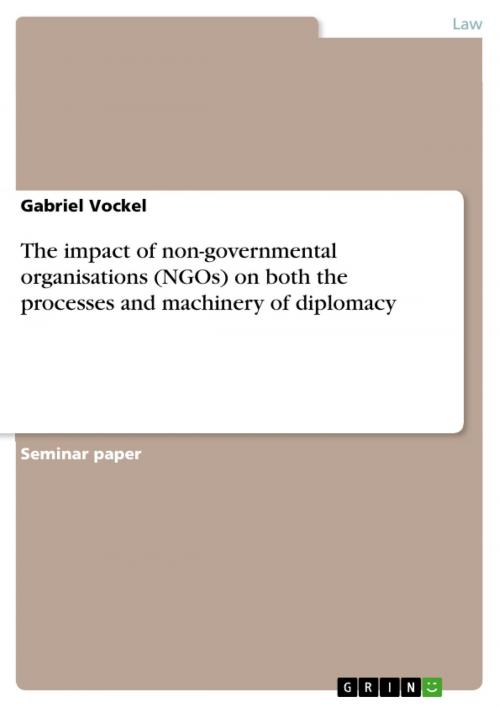The impact of non-governmental organisations (NGOs) on both the processes and machinery of diplomacy
Nonfiction, Reference & Language, Law, International| Author: | Gabriel Vockel | ISBN: | 9783638588911 |
| Publisher: | GRIN Publishing | Publication: | January 7, 2007 |
| Imprint: | GRIN Publishing | Language: | English |
| Author: | Gabriel Vockel |
| ISBN: | 9783638588911 |
| Publisher: | GRIN Publishing |
| Publication: | January 7, 2007 |
| Imprint: | GRIN Publishing |
| Language: | English |
Seminar paper from the year 2005 in the subject Law - Comparative Legal Systems, Comparative Law, grade: Merit, 68 %, Coventry University (Coventry Business School), course: Diplomacy and the International System, 46 entries in the bibliography, language: English, abstract: While there are less than 200 governments in the global political system, there are approximately 60.000 major transnational companies (TNCs), about 10.000 singlecountry Non-Governmental Organisations (NGOs), 250 Intergovernmental Organizations (IGOs) and approximately 5.800 International Non-Governmental Organizations (INGOs). 1 Crucially, the advent of globalization that brought about democratisation of international relations, transnational links and diffusion of power has greatly effected the large proliferation of so-called non-governmental (transnational) actors. This paper will attempt to give insight into the specific role of (both national as well as international) NGOs as they touch the international diplomatic realm. The paper also seeks to analyse whether this makes a significant difference for both processes and machinery of diplomacy as the particular adopted patterns, techniques and institutions of interaction and communication in the infrastructure of the international arena. While doing so, we will necessarily touch some controversial views that might claim different truths regarding the same facts that we are about to discuss. Although this is not (yet) the place to engage any deeper conceptual theoretical analysis, it is worthwhile to note shortly, that the state-centric approach of the realist school of thought will inevitably assign other - less important - impacts to the activities of NGOs than the pluralistic understanding of our modern political system, and will prescribe other modi to deal with activities of civil society groups. The foundation for these different biases regarding the importance of NGOs undoubtedly lies within the different theoretical premises into which both poles of thinkers venture. While wishing to allow the reader to explore some evidence that we have gathered, we will leave any further conclusions for a later moment. [...]
Seminar paper from the year 2005 in the subject Law - Comparative Legal Systems, Comparative Law, grade: Merit, 68 %, Coventry University (Coventry Business School), course: Diplomacy and the International System, 46 entries in the bibliography, language: English, abstract: While there are less than 200 governments in the global political system, there are approximately 60.000 major transnational companies (TNCs), about 10.000 singlecountry Non-Governmental Organisations (NGOs), 250 Intergovernmental Organizations (IGOs) and approximately 5.800 International Non-Governmental Organizations (INGOs). 1 Crucially, the advent of globalization that brought about democratisation of international relations, transnational links and diffusion of power has greatly effected the large proliferation of so-called non-governmental (transnational) actors. This paper will attempt to give insight into the specific role of (both national as well as international) NGOs as they touch the international diplomatic realm. The paper also seeks to analyse whether this makes a significant difference for both processes and machinery of diplomacy as the particular adopted patterns, techniques and institutions of interaction and communication in the infrastructure of the international arena. While doing so, we will necessarily touch some controversial views that might claim different truths regarding the same facts that we are about to discuss. Although this is not (yet) the place to engage any deeper conceptual theoretical analysis, it is worthwhile to note shortly, that the state-centric approach of the realist school of thought will inevitably assign other - less important - impacts to the activities of NGOs than the pluralistic understanding of our modern political system, and will prescribe other modi to deal with activities of civil society groups. The foundation for these different biases regarding the importance of NGOs undoubtedly lies within the different theoretical premises into which both poles of thinkers venture. While wishing to allow the reader to explore some evidence that we have gathered, we will leave any further conclusions for a later moment. [...]















